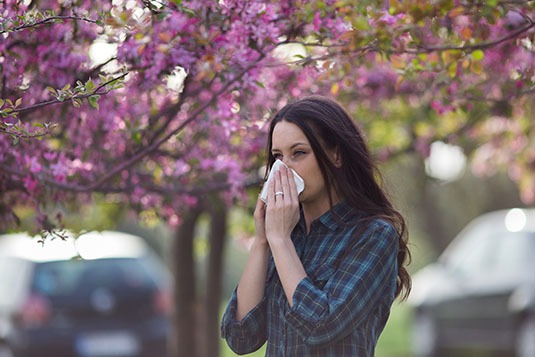Allergic rhinitis, hayfever and nasal allergy treatment
Many patients contact our clinic to discuss allergic rhinitis treatment. Allergic rhinitis is an allergic condition caused by environmental allergens coming into contact with the nose and eyes. This triggers an immune or allergic reaction resulting in inflammation of the nasal passages and the upper airway.
Sufferers are likely to experience clear nasal discharge and nasal congestion, in addition to sneezing, itchy nose, eyes and throat. Allergy and Anaphylaxis Australia states that 1 in 5 Australians have allergic rhinitis. In fact, it is one of the most common allergic conditions in Melbourne and Victoria.
Hayfever and allergic rhinitis triggers
The most common form of allergic rhinitis is hayfever where the allergy is to pollen. This typically occurs around Spring (October to December) and frequently causes symptoms of sneezing, itchiness and watery eyes. This is considered to be a seasonal type of allergic rhinitis. Other allergies are perennial which means they can occur anytime throughout the year, for instance a dust mite allergy.
Common allergens triggering allergic rhinitis include:
- Seasonal pollens
- Dust mites
- Mould
- Animal dander
- Cockroach droppings
Allergic rhinitis symptoms
People with allergic rhinitis typically experience symptoms after breathing in an allergen such as dust or pollen. The immune system recognises and overreacts to the allergen, resulting in a stuffy, congested nose, post nasal drainage, itching on the nose, eyes, throat and mouth, red and watery eyes, puffy eyelids, sneezing and cough.
The most common allergic rhinitis symptoms are:
- Stuffy nose
- Runny nose or post nasal drip
- Itching
- Red, watery, puffy eyes
- Sneezing
Allergic rhinitis diagnosis
Patients should discuss symptoms with their GP in the first instance. Diagnosis is based on analysis of symptoms and physical examination of the nose. Specific tests can confirm a diagnosis of allergic rhinitis, these include skin prick testing and blood tests.
- Skin prick test – the skin is pricked and exposed to small amounts of common allergens to determine if there is a reaction
- Blood test – this measures the immune system’s response to common allergens by testing sensitivity
Non allergic rhinitis
It’s important to consider that not all rhinitis is allergic. This condition may also be caused by non-allergic factors. The symptoms are similar and result from inflammation inside of the nose although non-allergic rhinitis typically excludes the symptom of itchiness.
Non allergic rhinitis may be triggered by perfume, smoke, fumes, weather changes, infections, alcoholic beverages, foods, medications and hormonal changes. Overuse of nasal decongestants may also be a contributing factor.
Nonallergic rhinitis may also be linked to:
- Sinusitis – inflammation or infection of the sinus membranes
- Medical conditions such as a deviated septum, which is a curvature of the cartilage that separates the nostrils
- Nasal polyps – soft benign growths on the lining of the nose or sinus
In this case, diagnosis may include nasal endoscopy or CT scan.
- During a nasal endoscopy an ENT specialist will examine inside the nasal passages using an endoscope.
- A CT scan can provide detailed images of the sinuses for analysis.
Allergic Rhinitis and Hayfever treatment
There are many long-term and short-term treatments for allergic rhinitis. The most common treatments of rhinitis involve nasal sprays, but other treatments such as desensitisation can also be considered.
Desensitisation is a process where the allergen (the thing the patient is allergic to) is gradually introduced to the patient in extremely small doses to decrease the immune reaction. A new treatment is a tablet under the tongue which can be administered at home without any need for injections
Allergen avoidance – Mould and dust mite allergies can be reduced by making adjustments to the home environment. Animal dander allergy can be reduced by avoiding touching cats and dogs for instance.
Saline rinses – rinsing the nose with a specially formulated saline solution
Antihistamine medications – these are commonly prescribed to treat allergies and stop your body from making histamine. These can be taken as tablets or as nasal sprays and eye drops.
Intra-nasal steroid sprays – these are considered very effective for treating allergic rhinitis and can significantly reduce nasal congestion and other symptoms
Sublingual immunotherapy – this involves placing a tablet with a mixture of several allergens under the tongue. It may be effective for allergies caused by cat dander, dust mites, grass and some pollens.
Allergy shots – another type of immunotherapy which involves regular injections
Surgery – while surgery is not a specific treatment for allergic rhinitis it can help to improve breathing in many cases. It creates additional space within the nose to help with delivery of medication as well minimise the effect of swelling of lining. Surgery to the inferior turbinates and to the septum may be an option for some patients who cannot resolve symptoms by other more conservative approaches.
What happens if allergic rhinitis is not treated?
Allergic rhinitis can have severe impacts on quality of life. It may be associated with negative outcomes such as:
- Behavioural issues in children
- Sleep disorders and fatigue
- Decreased ability to focus and concentrate on school or work
- Impaired coordination
- Missed days of school or work
- Increased motor vehicle accidents
If you, your child or someone in your family is suffering from the symptoms of allergic rhinitis, we suggest to make an appointment with your GP in the first instance. You can ask for a referral to our ENT Specialists if your diagnosis is unclear or your symptoms do not resolve.
Our ENT Specialist team
Our team is highly regarded in the field of allergic rhinitis and nasal allergies.
Mr Yi Chen Zhao (nose specialist)
- Nasal allergy and immunotherapy specialist
- The nose specialist and current head of nasal and sinus surgery at the Royal Victorian Eye and Ear Hospital.
- Specialist at the Royal Melbourne Hospital and St Vincent’s Hospital with the neurosurgeons that perform operations from the nose to the brain
Mr. Nathan Hayward
- ENT surgeon in Melbourne
- Unique expertise in sleep and snoring surgery
- Works with respiratory physicians to specialise in sleep studies and sleep apnoea
Mr. Sam Flatman
- ENT surgeon in Melbourne and visit Gippsland.
- Works at Peter MacCallum Cancer Centre treating head and neck cancers.
Mr. Tim Baker
- Experienced head, neck and rhinoplasty surgeon
- 20 years’ experience in all aspects of ENT specialising in rhinoplasty and head and neck cancers
Dr Lisa Wun
- ENT surgeon in Melbourne with over 12 years experience
- Fellowship trained in Head and Neck Cancer Surgery in Western Australia
- Specialises in head and neck cancers, paediatric and adult ENT, functional nasal and sinus surgery, and salivary gland/neck lumps
- Senior Lecturer at The University of Melbourne and Supervisor of Training at St Vincent’s Hospital
- Fluent in English, Cantonese and Mandarin
What to expect from your allergic rhinitis consultation
Before progressing with any treatments at ENT Specialist Group, we want you to have all the information you need to make an informed decision and know exactly what to expect.
There is no single treatment for allergic rhinitis as every case is different. Some patients may experience relief from non-surgical options while others may require nasal polyp removal, septorhinoplasty or other surgery to help control the symptoms.
Fast appointments for allergic rhinitis
While you might feel ready to start treatment for allergic rhinitis, long waiting lists often mean life can get in the way. At ENT Specialist Group, we’re HotDoc integrated which means you can book and schedule an appointment online or via mobile any time of night or day. We aim to accommodate urgent GP referrals within 24 hours.
What happens next?
If you’re in Melbourne or regional areas of Victoria and you’re concerned about allergic rhinitis, we invite you to contact us for a consultation. We will discuss all your options and help you feel empowered to take the next step.
Where can I make an appointment for allergic rhinitis diagnosis and treatment
To help ensure our nasal allergy services are accessible for all Victorians, We consult at various locations across metropolitan Melbourne and regional Victoria.
Visit us at:
- Heidelberg
- Bendigo
- Shepparton
- Sale
- Wantirna
If you’d like to understand more about treatment and surgical options, contact us today or make an online booking.


